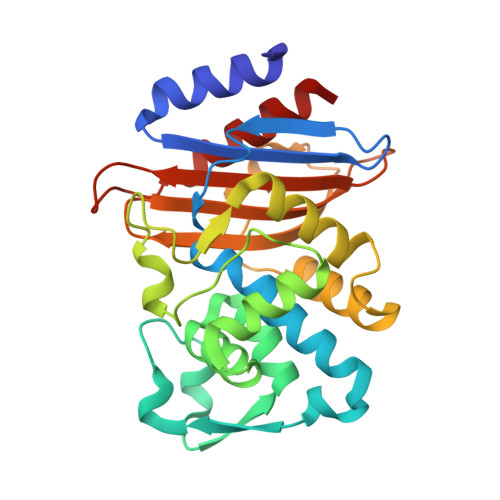Mechanisms of proton relay and product release by Class A beta-lactamase at ultrahigh resolution.
Lewandowski, E.M., Lethbridge, K.G., Sanishvili, R., Skiba, J., Kowalski, K., Chen, Y.(2018) FEBS J 285: 87-100
- PubMed: 29095570
- DOI: https://doi.org/10.1111/febs.14315
- Primary Citation of Related Structures:
5TOP, 5TOY, 5VLE - PubMed Abstract:
The β-lactam antibiotics inhibit penicillin-binding proteins (PBPs) by forming a stable, covalent, acyl-enzyme complex. During the evolution from PBPs to Class A β-lactamases, the β-lactamases acquired Glu166 to activate a catalytic water and cleave the acyl-enzyme bond. Here we present three product complex crystal structures of CTX-M-14 Class A β-lactamase with a ruthenocene-conjugated penicillin-a 0.85 Å resolution structure of E166A mutant complexed with the penilloate product, a 1.30 Å resolution complex structure of the same mutant with the penicilloate product, and a 1.18 Å resolution complex structure of S70G mutant with a penicilloate product epimer-shedding light on the catalytic mechanisms and product inhibition of PBPs and Class A β-lactamases. The E166A-penilloate complex captured the hydrogen bonding network following the protonation of the leaving group and, for the first time, unambiguously show that the ring nitrogen donates a proton to Ser130, which in turn donates a proton to Lys73. These observations indicate that in the absence of Glu166, the equivalent lysine would be neutral in PBPs and therefore capable of serving as the general base to activate the catalytic serine. Together with previous results, this structure suggests a common proton relay network shared by Class A β-lactamases and PBPs, from the catalytic serine to the lysine, and ultimately to the ring nitrogen. Additionally, the E166A-penicilloate complex reveals previously unseen conformational changes of key catalytic residues during the release of the product, and is the first structure to capture the hydrolyzed product in the presence of an unmutated catalytic serine. Structural data are available in the PDB database under the accession numbers 5TOP, 5TOY, and 5VLE.
- Department of Molecular Medicine, University of South Florida College of Medicine, Tampa, FL, USA.
Organizational Affiliation:























